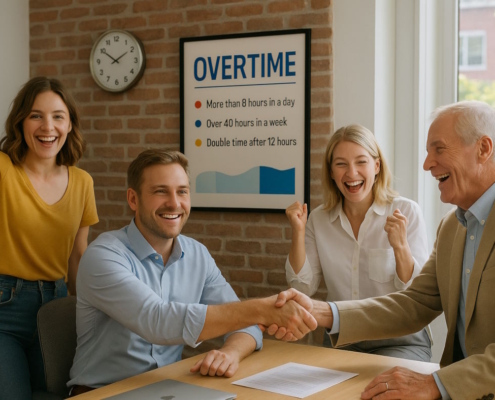When to hire an employment attorney?
You should hire an employment attorney as soon as you are aware of the issue or believe something is wrong and that the employer is not remedying the issue, such as harassment, wrongful termination, or discrimination.
By Brad Nakase, Attorney
Email | Call (888) 600-8654
State and federal law impose liability on employers for violating employees’ rights. When a problem arises in the workplace, whether it is related to wages, discrimination, workplace safety, or wrongful termination, you should hire an employment attorney. Skilled in both labor and employment law, an employment attorney can promote an employee’s interests during a dispute or can defend an employer in the event of a claim.
In this article, our lawyer for workers discusses when to hire an employment attorney as follows:
What is an employment lawyer?
There are two main kinds of employment attorneys that individuals can hire. The first kind of attorney specializes in representing plaintiffs, who are aggrieved employees. This attorney is sometimes known as an employment discrimination attorney, federal employment attorney, or employment rights attorney. The second kind of attorney specializes in representing defendants, or employers. This lawyer is also referred to as a management attorney.
Many workers do not have money to hire an employer attorney to help them. We’re frequently asked, “How Much Does It Cost To Hire a Lawyer To Sue My Employer?” This should not be a concern because most lawyers for workers represent their clients on a contingency basis.
In general, an employment attorney will specialize in representing one side of a dispute, either the defendant or plaintiff. However, it is possible to find attorneys who will take clients on either side of the argument.
An employment attorney is well-versed and skilled in all aspects of employment and labor law. They are familiar with handling issues related to discrimination, workplace safety violations under the Occupational Safety and Health Act (OSHA), and wage and hour violations.
When an employee, or plaintiff, hires an employment attorney, they can learn whether their rights were violated and whether further action is worth their time and effort. Before heading straight to court, an attorney will make sure that the employee has tried to resolve the matter internally. This may include following the procedures listed in the employee manual regarding reporting discrimination or harassment. If the issue concerns overtime, wages, or pay classification (exemption status), then an employment attorney can advise the employee on the Fair Labor Standards Act (FLSA) to help assess whether their rights were violated.
An employer may unwittingly, or purposefully, violate a number of labor laws. However, some laws have threshold or employee count requirements, with which an attorney will be familiar.
When to get advice from an employment attorney?
When an employee suspects that they have experienced a labor violation at their place of work, they should first try to remedy the situation with the employer. If this does not produce results, then an employee should next turn to the Equal Employment Opportunity Commission (EEOC) to report any harassment or discrimination. In this sense, it is not necessary to rush to an employment attorney. It is important to exhaust all one’s options first.
If the company involved is small and the employer themselves is at the center of the argument, then an employee should consider getting legal advice from an employment attorney. The employee will likely have to file a complaint with either the state or federal government, which should be the first point of contact outside the company. When the government agency investigates the complaint, they will decide if there is enough evidence to prove a violation. If this is the case, the agency will help the employee form a charge or claim.
If the agency determines that there is not enough evidence to establish a claim, an employee can still file a lawsuit. If the agency is unable to help at this point, they will advise the employee to contact an employment attorney. This is when an employee will want to speak with an attorney to better understand their rights and judge whether their situation merits a lawsuit.
But didn’t the agency say there was not enough evidence?
Even if an agency decided against pursuing a claim, a lawsuit may still be appropriate. The reality is that agencies do not spend a lot of time or resources on investigating complaints: there is no cross-examination or depositions. This is true even if the employee has hired a lawyer at that point; the lawyer will not play a part in the agency’s investigation.
It is possible that the U.S. Department of Justice may take on a case. However, the department only accepts a case when it is hoping to set a precedent nationwide or when a major company is involved in systemic discrimination.
It should be noted that employees have won lawsuits against employers even when the EEOC dismissed their complaint. Of course, employers sometimes win cases even when the EEOC has approved them.
How do you protect yourself as an employee?
If an employee believes that he or she is experiencing discrimination or is not being paying properly, they should make sure to keep an accurate account of all incidents, as well as times and dates. Witnesses should also be noted. Such information will aid agencies and attorneys in the event the employee takes action.
What are the ways an employer can protect themselves?
It is important that even the smallest companies have employee manuals containing rules and policies that address harassment, discrimination, and pay. The handbook should inform employees how to file a complaint internally. When an employee files a complaint, it is the employer’s duty to investigate the claim and judge if there was unlawful behavior.
Have a quick question? We answered nearly 2000 FAQs.
See all blogs: Business | Corporate | Employment Law
Most recent blogs:
Contact our attorney.
































